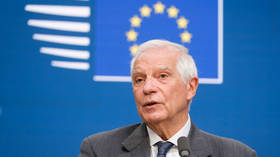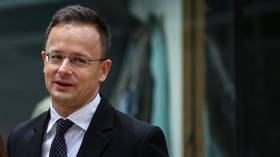EU imports from Russia drop at ‘unprecedented’ pace – Borrell

The drop in trade between Russia and the EU over the past year is one of the major signs that Brussels’ sanctions on Moscow have been successful, EU foreign policy chief Josep Borrell, has claimed. His article, titled ‘Yes, the sanctions against Russia are working’, which was published on Saturday on his EEAS blog.
According to Borrell, EU imports from Russia dropped by 58% in 2022, which he called “an unprecedented decoupling.”
“This movement is accelerating: the decline in imports is above 75% for the first quarter of 2023, and the fall is even greater for energy goods, at minus 80%.”
He noted that EU exports of goods to Russia last year also dropped 52% below the annual average prior to 2022.
“Within a year, [the sanctions] have already limited Moscow’s options considerably, causing financial strain, cutting the country from key markets and significantly degrading Russia’s industrial and technological capacity,” Borrell said. He added that Russia’s “technological degradation” and the exit of foreign companies, a number of which left the country under sanctions pressure, “will hamper investment and productivity growth for years.”
“And the outlook for 2023 remains bleak. According to the latest OECD report, Russia’s GDP is foreseen to shrink by up to 2.5%... In short: Russia’s decision to attack Ukraine has obviously pushed the Russian economy towards isolation and decline.”
Meanwhile, both economic data and experts’ projections paint a different picture. Despite the sanctions, trade has been on the rise in both the energy and non-energy sectors due to Moscow’s successful efforts to reorient from Western markets to the East. For instance, according to data from Chinese customs, as of the end of 2022, Russia became the top European country in terms of exports to China, fourth in terms of imports, and second in trade turnover. In recent months, Russia has also become the largest exporter of oil to both China and India.
According to a recent World Bank report, Russia moved into the world’s top five largest economies in 2022 based on purchasing power parity, outpacing the EU’s largest economy, Germany. Both the World Bank and the IMF recently raised their forecasts for the Russian economy, saying GDP would continue to grow amid strong trade and industrial production, as well as higher-than-expected energy revenues. Russian Finance Minister Anton Siluanov said this week that the country’s economy is expected to grow about 2.5% by the end of the year, fully recovering from last year’s decline.
By contrast, the Eurozone entered a recession earlier this year after energy prices spiked following the drop in gas flows from Russia, which was once its largest energy supplier. Despite its efforts, the European Central Bank has been unable to bring inflation in the region to the target level and turn the economy towards growth. According to a recent ECB forecast, Eurozone GDP growth is expected to slow to 0.9% by the end of the year from 3.5% in 2022.
For more stories on economy & finance visit RT's business section













